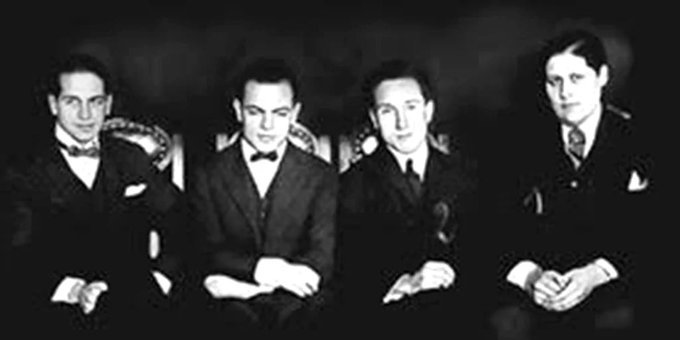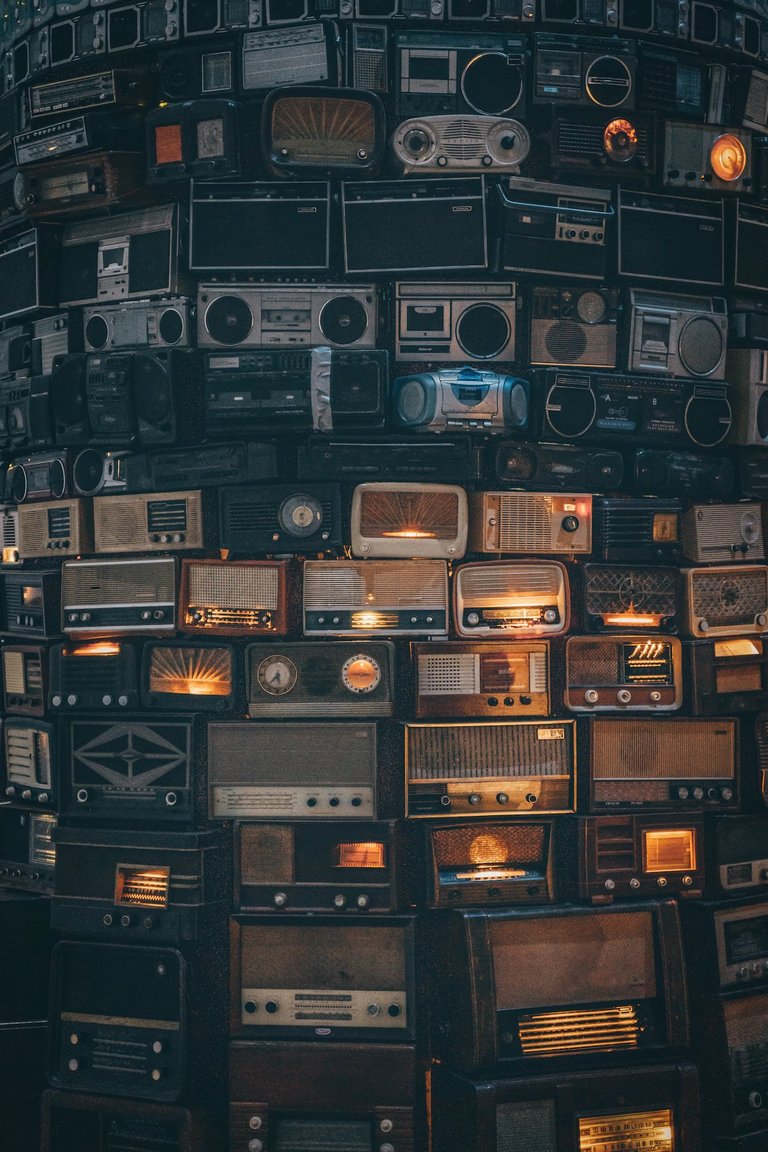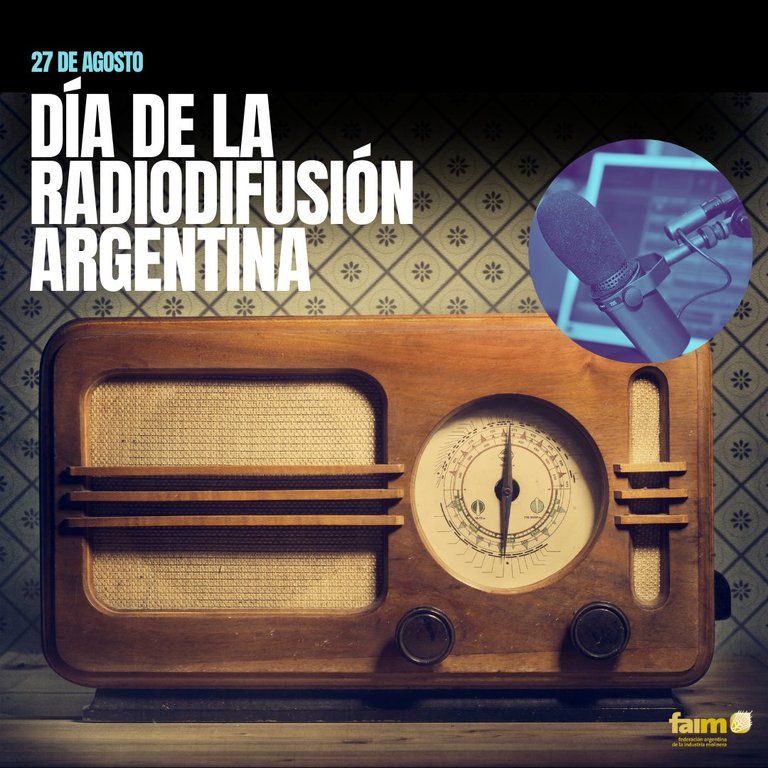
Aquí en mi país esta expresión puede significar que algunas personas no están bien de la cabeza, es decir que se comportan como enfermos psiquiátricos, coloquialmente "locos".
Sin embargo, la expresión nació como una descripción bastante acertada del accionar y comportamiento de un pequeño grupo de personas que tuvieron una idea y la plasmaron en la primera trasmisión de radio de mi país (y algunos aseguran que fue la primera en el mundo para un público en general).
Un 27 de agosto de 1920 un grupo liderado por el doctor en medicina Enrique Telémaco Susini trasmitió el festival escénico sacro "Parsifal" de Richard Wagner desde la terraza del teatro Coliseo, donde la obra se estaba presentando, según registros, una pequeña cantidad de personas estimada entre 50 y 100 escucharon la trasmisión que por supuesto se convirtió en un hito histórico para la radiofonía argentina y mundial.
A ese grupo de entusiastas aficionados y fanáticos de ese novel invento que representaba la propagación del sonido por de ondas de radio se los conoció como "Los locos de la Azotea".
Uds. pensaran que tiene que ver esto con el deporte. Mucho, muchísimo es mi respuesta.
Las trasmisiones de radio acercaron los deportes a una gran cantidad de personas en épocas en que la única forma de saber algo de un partido de fútbol, de una carrera de automóviles, de una maratón o cualquier otra expresión deportiva era ir a presenciar el evento o esperar a que los periódicos de la época escribieran algo sobre ellos.
Creo no equivocarme si digo que la popularidad de muchos deportes que hoy disfrutamos se consiguió gracias a los relatos que eran trasmitidos y escuchados por radio, el único medio de difusión que existió en los albores del siglo XX hasta la aparición de la televisión y también durante muchos años de compartir y competir con ese otro adelanto tecnológico que representó la trasmisión de imágenes que en los primeros años de la TV no llegaban con los medios técnicos disponibles a mostrar en vivo las imágenes de un encuentro deportivo.

Con el transcurrir de los años, una gran cantidad de personas aseguraban que la radio moriría con el paso del tiempo y todo gracias a la TV, ese mismo paso del tiempo confirmó que ese medio de trasmisión de la palabra no ha muerto y se encuentra más vivo que nunca. La radio es irremplazable en muchos ámbitos de la vida de las personas y también en los deportes.
Hasta hace no mucho tiempo, cuando había un par de excelentes relatores de fútbol cuyo relato me fascinaba, yo miraba los partidos por la televisión, pero bajaba el volumen de la misma y ponía el de la radio.
La llegada del cable a la TV ha encarecido los costos de disfrutar las imágenes de un encuentro de fútbol, los derechos de trasmisión se venden a cadenas que luego recaudan en publicidad, pero también en abonos para los espectadores. Hoy en día en mi país solo trasmiten por TV abierta algunos pocos encuentros de fútbol del torneo local y jamás a los principales equipos como Boca Juniors o River Plate, por lo tanto, para verlos en directo y no hay entradas disponibles para asistir al estadio, hay que comprar un abono adicional de TV al que por estos días llaman "Pack fútbol" que no siempre es posible, entonces queda disfrutar un buen relato por radio, la salvadora de los pobres.
Algunos deportes se popularizaron gracias a la radio, ya he mencionado el fútbol, pero hay muchos otros, por ejemplo el beisbol que aún hoy es trasmitido y seguido por radio por millares de fanáticos, inclusive, al igual que en el fútbol, algunos prefieren esa trasmisión relatada a observar las imágenes por TV, parece una locura, pero la radio tiene algo que la TV no puede dar y es la posibilidad de imaginar la mejor versión del escenario, del encuentro, exacerbar la pasión de los jugadores y los gritos del público aplaudiendo las jugadas.

En ese sentido es como un buen libro, permite que la imaginación supla y complemente lo que no se puede ver, la mente humana es poderosa, por algo se asegura que un buen libro difícilmente pueda ser llevado al cine y que no defraude a sus lectores. Algo como eso ocurre con las trasmisiones de radio, en parte la escenificación del espectáculo es responsabilidad del relator, pero también hay un buen porcentaje que pone el que escucha e imagina.
La palabra hablada es sinónimo de radio y por ello jamás morirá mientras haya en el mundo una persona dispuesta a escuchar.
Cada 27 de agosto se celebra en mi país el día de la radiodifusión en recuerdo y homenaje a "los locos de la azotea".
Rooftop Madmen
Here in my country, that expression can mean that some people are not right in the head, that is, they behave like psychiatric patients, colloquially "crazy."
However, the expression was born as a fairly accurate description of the actions and behavior of a small group of people who had an idea and expressed it in the first radio broadcast in my country (and some say it was the first in the world for a general public).
On August 27, 1920, a group led by medical doctor Enrique Telémaco Susini broadcast the sacred stage festival "Parsifal" by Richard Wagner from the terrace of the Coliseo Theater, where the work was being presented. According to records, a small number of people estimated between 50 and 100 listened to the broadcast, which of course became a historic milestone for Argentine and world radio.
This group of enthusiastic fans and fans of this new invention that represented the propagation of sound through radio waves was known as "The Rooftop Madmen."
You might wonder what this has to do with sports. A lot, a lot is my answer.
Radio broadcasts brought sports closer to a large number of people at a time when the only way to find out about a football match, a car race, a marathon, or any other sporting event was to go and watch the event or wait for the newspapers of the time to write something about it.
I think I'm not wrong if I say that the popularity of many sports that we enjoy today was achieved thanks to the stories that were transmitted and heard on the radio, the only means of broadcasting that existed at the dawn of the 20th century until the appearance of television and also for many years of sharing and competing with that other technological advance that represented the transmission of images that in the early years of TV did not reach the technical means available to show live pictures of a sporting event.
Over the years, many people have claimed that radio would die with time, thanks to TV. That same passage of time confirmed that this means of transmitting the word has not died and is more alive than ever. Radio is irreplaceable in many areas of people's lives and also in sports.
Not long ago, when there were a couple of excellent football commentators whose commentary fascinated me, I watched the games on television. Still, I turned down the volume and turned on the radio.
The arrival of cable TV has made it more expensive to enjoy the images of a football match; the broadcasting rights are sold to networks that then collect in advertising, but also in subscriptions for the spectators. Nowadays in my country they only broadcast a few local tournament football matches on open TV and never the main teams like Boca Juniors or River Plate, therefore, to see them live and there are no tickets available to attend the stadium, you have to buy an additional TV subscription, which these days they call "Football Pack" which is not always possible, so you have to enjoy a good commentary on the radio, the savior of the poor.
Some sports became popular thanks to the radio, I have already mentioned football, but there are many others, for example, baseball, which is still broadcast and followed by thousands of fans on the radio. Even, just like in football, some prefer the broadcast to watching the images on TV. It seems crazy, but the radio has something that TV cannot give and that is the possibility of imagining the best version of the scenario, of the match, exacerbating the passion of the players and the shouts of the public applauding the plays.
In this sense it is like a good book, it allows the imagination to replace and complement what cannot be seen, the human mind is powerful, and for some reason, it is ensured that a good book can hardly be brought to the cinema and that it does not disappoint its readers. Something like that happens with radio broadcasts, in part, the staging of the show is the responsibility of the narrator, but there is also a good percentage that is provided by the listener and the imaginer.
The spoken word is synonymous with radio and will therefore never die as long as there is a person in the world willing to listen.
Every August 27th, in my country, Radio Broadcasting Day is celebrated in memory and tribute to "the crazy people on the roof."
Héctor Gugliermo
@hosgug


